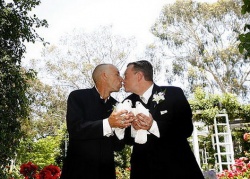Same-sex marriage
A same-sex marriage is a legally recognized union between two people of the same gender, i.e. two homosexuals. Same-sex marriages have only of late become legal in several European countries and in a few states in the United States. However, such unions may have existed in some parts of the ancient world, including in India. The Kāma Sūtra (4th century CE) mentions marriages between men, although it is not clear if these were performed by Hindu priests or were recognized by the state, probably not. In his Jayamaṅgala (13th century?), Yaśodhara says: ‘Freemen of this inclination (i.e. homosexuals) who reject women and can willingly do without them because they love each other, get married, bound by a deep trusting friendship.’ Any close, long-term relationship will endure and be fulfilling if the couple involved are faithful to each other (D.III,190), speak loving words to each other (A.II,59), have compassion and love towards each other, and look upon each other as their mentor and teacher (A.III,295-8).
What would be the Buddhist attitude to such marriages? Buddhism sees marriage as a secular institution, an arrangement between two people, and thus Buddhist monks or nuns do not perform marriages, although they are often called upon to bless the couple either just before or just after the marriage. Monks also often give short sermons and chant a few suttas during the opening of new businesses, at birthdays, funerals and at the bedside of the sick or the dying. If two men or two women were deeply committed to each other and wanted a monk to bless their union and wish them well in their life together, it is not difficult to imagine that he would be happy to do this for them.
